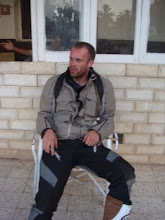On Friday, I headed to the Parc with three great friends to see Into the Wild. The film is everything the critics have claimed: beautifully shot, elegantly and sparsely scored by Eddie Vedder, and terribly well-written. This is much to Sean Penn's credit, however great the original accounts by John Krakauer.
For those who don’t know the story, the movie recounts the real life journey of Chris McCandless, a young, idealistic, ram-rod righteous, and driven man. A fresh graduate of Emory University, he gives away his remaining college fund to Oxfam, intentionally ends contact with his family, and decides to tramp across America. After two years, he makes his way to Alaska, heading alone into the bush in April. He soon finds an abandoned-bus-turned-hunt camp. He is terribly unprepared, carrying a meagre 10 lb bag of rice, a rifle, a pad and sleeping bag, and other sundries, including a guide to local flaura and fauna. He has no proper map, and thus no firm knowledge of the topography of his surroundings.
He has, apparently, little knowledge of the local wildlife, either. In June, McCandless' journal records the shooting of a large moose, which Krakauer claims was a large caribou. These are not similar animals. If Krakauer’s account is correct, and if Penn’s portrayal is wrong, then this suggests the McCandless was quite distinctly unprepared for his adventure.
Despite this unpreparedness, McCandless survives until July. He decides then that he has proven his point, tested his resilience, and that the time has come either for an end to adventures or for a new one. But as he leaves his camp and makes his trek back to the road, he finds that the waist deep finger of a river he crossed on his way out is now a chest-deep and raging arm of water. Writing "DISASTER" in his journal that night, he is left to again scratch out an existence from the abandoned bus. What the movie does not reveal is that the river could be easily crossed just a few miles upstream. With no map, McCandless could not know this. He is instead left again to his devices.
McCandless eventually starves to death, probably because he was eating a poisonous root, misidentified in his field guide, which prevented his body from absorbing any nutrients. His body is found some weeks later, alone in a blue sleeping bag his mother had knit for him many years earlier.
The scene of McCandless’ death, if the metaphor is not too crude, is simply breathtaking. It is some strange mix of horror and stoicism. It is also likely wrong. If Krakauer is to be believed, McCandless’ death was not welcome. Rather, those who found his body first found the following note on the outside of his bus:
"S.O.S I need your help. I am injured, near death, and too weak to hike out of here. I am all alone, this is no joke. In the name of God, please remain to save me. I am out collecting berries close by and shall return this evening. Thank you. Chris McCandless. August ?”
This was no welcomed death. There was no evidence of courage. There were no signs of a stoic passing. Instead, there were just signs that a young man’s luck had finally run out, that his righteousness had gotten him no where, and that he knew it.
There is no question: this is a breathtaking movie. And it is angering. There is no undue compassion invoked for McCandless. But, still, I cannot understand why Penn does not go the extra step and tell the story with extreme accuracy. Why does he omit, for example, that McCandless was an afternoon’s walk up the river from safety? Why does he not reveal McCandless’ ignorance of ungulates? And why, even at the end, does he omit the trip of his half-brother, one of six-half siblings of which Penn only reveals one, to retrieve his ashes? Why does he say it was only his sister who made the journey?
This is a breathtaking movie because it tells a true story and tells it well. But it was a story which needed no embellishment, and it’s for shame that Penn chose to ignore some fundamental truths.
Monday, October 22, 2007
Subscribe to:
Post Comments (Atom)

No comments:
Post a Comment